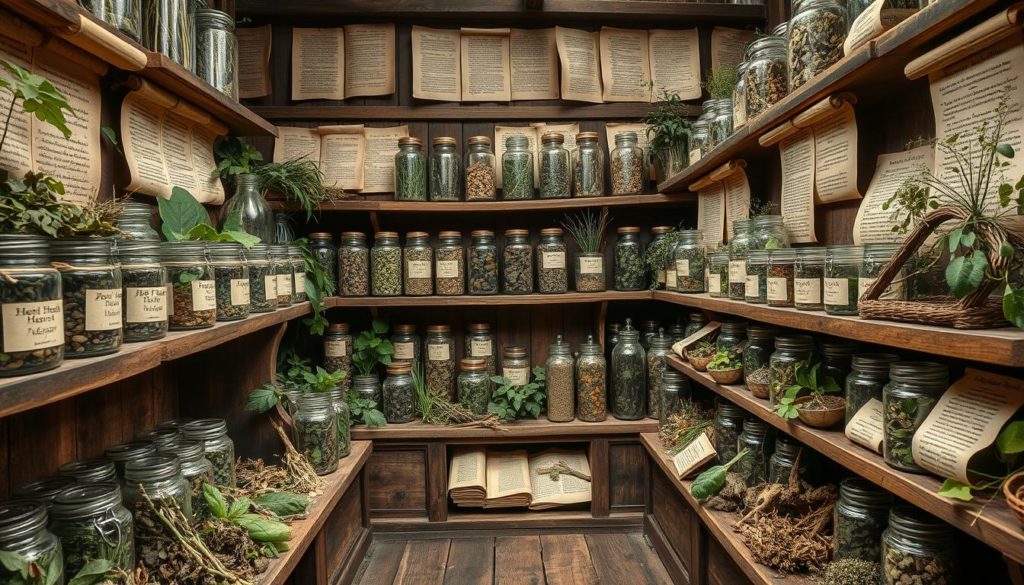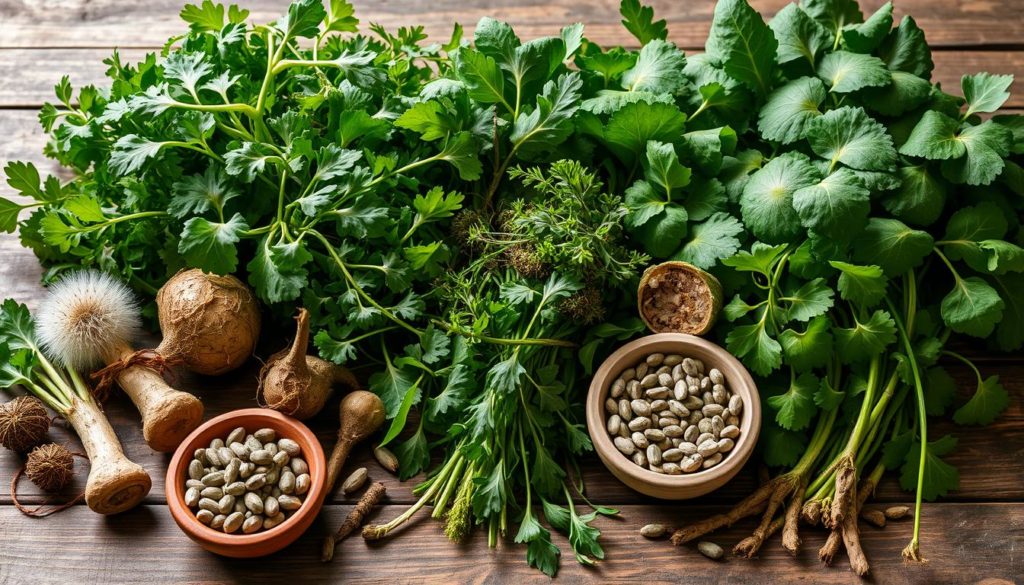The global market for herbal supplements could hit $8.5 billion by 2025. A big part of this growth comes from bitter herbs. These plants are gaining fame for their health perks, making them a staple in daily wellness habits.
Using bitter herbs isn’t something new. People worldwide have used their power for health for centuries. Nowadays, adding these herbs to your routine can boost your health. They help with digestion and boost your immune system, making their benefits worth your time.
The Historical Significance of Bitter Herbs
Bitter herbs hold a significant place in our past and culture. They’ve been used in ancient remedies and rituals. These plants have greatly influenced human health and traditions.
Ancient Practices
In the past, people widely used bitter herbs as natural remedies. The Ancient Egyptians chose bitter herbs like chicory and dandelion. They believed these plants could clean the blood and help with digestion.
Many civilizations used bitter herbs, including the Greeks and Romans. They valued these herbs for their healing properties. This has helped shape today’s herbal medicine practices.
Cultural Rituals
Bitter herbs are key in many cultural traditions. During Passover, Jews use them to remember the harsh times in Egypt. In Traditional Chinese Medicine (TCM), herbs like gentian and rhubarb are valued for health.

Historical texts and scriptures often mention bitter herbs. They show us how important these plants were in ancient health practices. Today, they still offer valuable lessons for modern health.
| Civilization | Common Bitter Herbs | Uses |
|---|---|---|
| Ancient Egypt | Chicory, Dandelion | Blood purification, digestion |
| Greece and Rome | Various bitter tonics | Medicinal properties |
| Jewish Tradition | Horseradish, Romaine Lettuce | Symbolic in Passover |
| Traditional Chinese Medicine | Gentian, Rhubarb | Health and balance |
What are Bitter Herbs?
Bitter herbs are plants recognized for their unique, often strong taste. They are used in many traditions for their health perks. You’ll find dandelion, gentian, and chicory among these, each with special healing effects.

These herbs help kickstart your digestive system, boosting both hunger and the digestion process. Their tastes vary from slightly sour to very bitter. This makes them important in remedies and foods that aid digestion. Knowing about bitter herbs can help pick the right one for health needs.
Their bitterness, which helps detox the liver, boost gut health, and improve how well we absorb nutrients, is key. They get their taste from natural compounds like sesquiterpene lactones, alkaloids, and flavonoids.
| Types of Bitter Herbs | Characteristics | Health Benefits |
|---|---|---|
| Dandelion | Sharp, tangy taste | Supports liver detoxification, aids digestion |
| Gentian | Extremely bitter | Stimulates appetite, enhances bile flow |
| Chicory | Slightly bitter, earthy | Improves gut health, reduces inflammation |
Bitter herbs have vital roles in today’s herbal medicine due to their therapeutic traits. They improve digestion and have anti-inflammatory benefits. Adding them to your diet regularly is a way to use their perks for better health.
Health Benefits of Bitter Herbs
Bitter herbs are known for their amazing health benefits. Adding them to your daily routine can bring many benefits. You get not only more nutrients but also help in preventing diseases.
Rich in Nutrients
Dandelion, chicory, and gentian are bitter herbs full of vitamins and minerals. They have lots of vitamins A, C, and K. Plus, they have calcium, potassium, and magnesium. These are important for staying healthy and meet your dietary needs.
Anti-inflammatory Properties
Bitter herbs are famous for their anti-inflammatory qualities in science. Adding anti-inflammatory herbs to your meals might decrease inflammation. This can ease pain from arthritis. Research shows that bitter herbs can help control the body’s inflammation.
Boosts Immune System
One top Bitter Herbs benefit is boosting immune system support. Bitter herbs have phytochemicals. They boost the immune system and make more white blood cells. This helps fight infections. Eating them often makes your body’s defenses stronger, keeping you well all year.
“Bitter herbs have been used across different cultures for their strong health properties. They are great at boosting the immune system and reducing inflammation.” – Dr. Andrew Weil
How to Incorporate Bitter Herbs in Your Diet
Adding bitter herbs to your diet is a fun way to live healthier. They are tasty and full of benefits. You can easily mix them into meals and drinks. This boosts your health and makes your food more interesting.
Bitter Herb Teas
Drinking bitter herb teas is a great method to enjoy their benefits. Just soak dried herbs like dandelion root, burdock, and gentian in boiling water for 10 minutes. This process pulls out the good stuff into the tea. Drinking these teas can help with digestion, cleanse the liver, and improve your overall health.
Bitter Herb Smoothies
Try bitter herbs in your smoothies for a fresh idea. Mix kale, spinach, dandelion greens, and ginger for a tasty drink. Adding fruits like pineapple or berries balances the bitter taste. This mix is not only delicious but also helps with detox and boosts your nutrition.
Cooking with Bitter Herbs
Using bitter herbs in cooking is a smart way to get their health perks. You can make your meals taste better and be healthier. For example, mixing chicory or endive into a salad adds a nice bitter flavor. Using Rosemary or thyme in sauces or marinades also enhances your food’s taste. Try different bitter herbs in your cooking to find tasteful and healthy combinations.
Check out this table for common bitter herbs and how to use them:
| Bitter Herb | Culinary Use |
|---|---|
| Dandelion Greens | Salads, Smoothies, Teas |
| Chicory | Salads, Coffee Substitutes |
| Gentian | Teas, Cocktail Bitters |
| Burdock Root | Stews, Teas |
Bitter Herbs for Digestion
Adding bitter herbs to your daily routine can greatly improve your digestion. These herbs are known for their unique taste. They have been used to boost gut health and ease digestive problems for centuries.
Improving Gut Health
Bitter herbs are key to better gut health. They kickstart the production of digestive juices and enzymes. This leads to improved digestion and nutrient uptake. Herbs like dandelion, chicory, and gentian help keep your gut healthy, making sure it works well.
Relieving Bloating and Gas
Bloating and gas can be uncomfortable, but bitter herbs offer a natural solution. They contain compounds that calm the digestive system. This helps ease pain and lets trapped gas pass. Using these herbs regularly can naturally help with bloating and boost your digestive health.
Bitter Herbs for Weight Loss
Recently, more people are looking into bitter herbs for weight loss because of their health benefits. Including these herbs in your diet helps manage weight by increasing metabolism and controlling hunger.
Metabolism Boost
Dandelion and gentian, known bitter herbs, help speed up metabolism. Research shows they activate the digestive system, boosting metabolic rate. Adding them to your meals may lead to quicker calorie burn.
- Dandelion: Known for its diuretic properties, this herb helps in flushing out toxins and reducing water weight.
- Gentian: Stimulates the digestive juices, aiding in breaking down food more efficiently.
Appetite Control
Another way bitter herbs for weight loss assist is by reducing hunger. Chicory and artichoke, for instance, have compounds that make you feel full. By easing hunger cravings and lowering calorie intake, these herbs support weight loss.
- Chicory: Rich in inulin, a type of fiber that promotes a feeling of fullness.
- Artichoke: Contains cynarin, which enhances bile production, aiding digestion and reducing hunger.
Using bitter herbs is a smart move for managing weight. They work by metabolism boosting and appetite suppression. Adding these herbs to your daily diet could help you reach your weight loss targets easier.
Popular Bitter Herbs and Their Uses
Bitter herbs are celebrated for their health benefits and uses. We’ll look at three popular ones: Dandelion, Chicory, and Gentian.
Dandelion
Dandelion is more than a common weed. It boosts health by promoting digestion and detoxifying the liver. It’s also packed with vitamins A, C, and K. Dandelion roots and leaves are used in teas and salads, adding flavor and nutrition.
Chicory
Chicory is known for its health remedies and bitter compounds. These help with digestion and liver function. It also fights inflammation, helps manage weight, and improves heart health. Chicory is used as a coffee substitute and in salads and stews.
Gentian
Gentian is valued for its therapeutic uses. It helps stimulate appetite and treat indigestion, improving gastrointestinal health. Used in tinctures and bitters, gentian is key in herbal medicine.
| Herb | Uses | Benefits | Forms |
|---|---|---|---|
| Dandelion | Digestive aid, liver detox | Rich in vitamins A, C, and K | Teas, salads |
| Chicory | Digestion, liver function | Reduces inflammation | Coffee substitute, salads |
| Gentian | Improves appetite, digestion | Boosts GI health | Tinctures, bitters |
Bitter Herbs Supplements: Pros and Cons
In recent years, health fans have started to love Bitter Herbs supplements. They are liked for the many herbal supplements benefits they offer in an easy way. Here, we look at the good and bad sides of these supplements to help you make a choice.
- Convenience: Bitter Herbs supplements make it simple to add good herbs to your day, even for the very busy.
- Consistent Dosage: You get a steady and exact amount of herbs with these supplements, making sure you get just what you need.
- Longer Shelf Life: Supplements last longer than fresh herbs, which means less waste and always being able to have them.
Cons of Bitter Herbs Supplements:
- Quality Concerns: The success of Bitter Herbs supplements depends a lot on the herb’s quality. Poor ingredients can lower their value.
- Limited Freshness: Supplements might not be as fresh or taste the same as whole herbs, which might make them less effective.
- Potential Interactions: Like all supplements, Bitter Herbs can affect medications. It’s key to talk to a doctor before starting them.
| Pros | Cons |
|---|---|
| Convenience | Quality Concerns |
| Consistent Dosage | Limited Freshness |
| Longer Shelf Life | Potential Interactions |
Compare the herbal supplements benefits to these points to see if Bitter Herbs supplements meet your health needs. Make sure to pick products from trusted brands for the best quality and results.
Potential Side Effects of Bitter Herbs
Bitter herbs are popular for their health benefits. However, they can also have side effects. Knowing these risks is key to using them safely.
Allergic Reactions
Allergic reactions to bitter herbs can happen. Symptoms may include skin rashes, itching, and swelling. Sometimes, they can even lead to breathing problems.
It’s wise to test a small area of your skin first. Or, talk to a doctor before trying new herbs. This is especially important if you’re allergic to other things.
Interaction with Medications
Certain bitter herbs, like St. John’s Wort, can affect how your medications work. They might make drugs stronger or weaker. This is a big concern for those on blood thinners, diabetes medication, or antidepressants.
Always check with a healthcare provider before mixing bitter herbs with your medicines. This can help prevent any harmful interactions.
DIY Bitter Herb Recipes
Creating Bitter Herbs DIY recipes at home is both empowering and easy. These recipes help with digestion, boost mood, and aid in relaxation.
Homemade Tinctures
Making homemade tinctures is a great way to use bitter herbs. You need herbs like motherwort, hops, chamomile, and spearmint to start. Here’s how to make your tincture:
- Gather Ingredients: Choose dried or fresh herbs such as motherwort, hops, chamomile, and spearmint.
- Prepare the Mason Jar: Put herbs in a mason jar and cover with high-proof alcohol. Ensure herbs are fully submerged.
- Seal and Store: Close the jar well and keep it in a dark, cool place for 4-6 weeks. Shake it now and then.
- Strain the Mixture: Use a fine strainer or cheesecloth to separate the herbs from the liquid after steeping.
- Bottle the Tincture: Pour the liquid into dark dropper bottles for storing and using it easily.
For detailed tincture information, check out DIY herbal recipes online.
Bitter Herb Salad Dressings
You can also use bitter herbs in homemade dressings. This adds great flavors and health perks to salads. Here’s an easy dressing recipe:
- Ingredients: Use olive oil, balsamic vinegar, dandelion leaves, thyme, salt, and pepper.
- Preparation: Chop the herbs finely and mix with olive oil, vinegar, salt, and pepper.
- Assembly: Dress your favorite greens with this mix for a tasty and healthy salad.
These herbal dressings not only taste good but are also good for digestion.
Trying Bitter Herbs DIY recipes is a fun, healthy way to spice up your wellness routine. With tinctures or dressings, adding these herbs into your daily habits is simple.
Bitter Herbs in Modern Medicine
Modern medicine has begun to see the value in bitter herbs. Scientists and doctors are exploring how these herbs can be part of our health. They’re looking into traditional cures as more people want natural treatments.
Scientific Studies
There’s a lot of research on the health benefits of bitter herbs. Studies show they can help with digestion, ease inflammation, and support the liver. For example, herbs like dandelion and chicory have been found to help with various health issues. This research proves that bitter herbs have a big role in herbal medicine today.
Doctor’s Recommendations
Doctors are beginning to suggest bitter herbs as part of treatment plans. They’re recommended for patients with stomach problems, metabolism issues, or inflammation. Herbs such as gentian and wormwood are often suggested for better gut health. This advice from doctors shows how ancient remedies and modern science are coming together.
FAQ
What are the health benefits of bitter herbs?
Bitter herbs are loaded with important nutrients and fight inflammation well. They help the immune system. They are also great for digestion and improving gut health.
How can I incorporate bitter herbs into my daily health regimen?
Adding bitter herbs to teas, smoothies, and your cooking is easy. They are also available as supplements. Or use them in home remedies like tinctures and salad dressings.
What are some ancient practices involving bitter herbs?
Throughout history, different cultures have used bitter herbs for health. Ancient texts and digs show their use in old health practices and customs.
What are some common types of bitter herbs?
Some well-known bitter herbs are dandelion, chicory, and gentian. Each offers unique health perks for traditional and modern uses.
Can bitter herbs help with digestion?
Yes, they’re great for digestion. Bitter herbs can boost gut health and ease symptoms like bloating and gas.
Are bitter herbs effective for weight loss?
Bitter herbs can help lose weight by increasing metabolism and controlling appetite. Research shows they can affect metabolic rates and appetite positively.
What are the pros and cons of taking bitter herbs supplements?
Supplements of bitter herbs are easy to use and can be effective. But it’s important to check their safety, effectiveness, and any side effects or drug interactions.
What are the potential side effects of bitter herbs?
Usually safe, bitter herbs can sometimes cause allergies or affect certain medicines. Always talk to a healthcare professional before starting them.
Are there any modern medical studies on bitter herbs?
Indeed, current research has looked into how bitter herbs it benefit health conditions. Many doctors now suggest adding these herbs to your wellness plan.
How can I make DIY recipes with bitter herbs?
Making your tinctures and salad dressings with bitter herbs is fun. These homemade recipes offer special tastes and health advantages to your daily meals.


